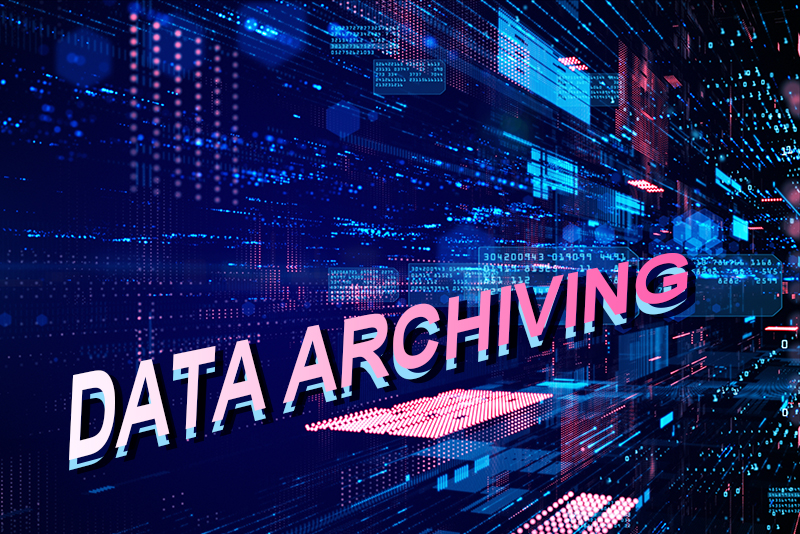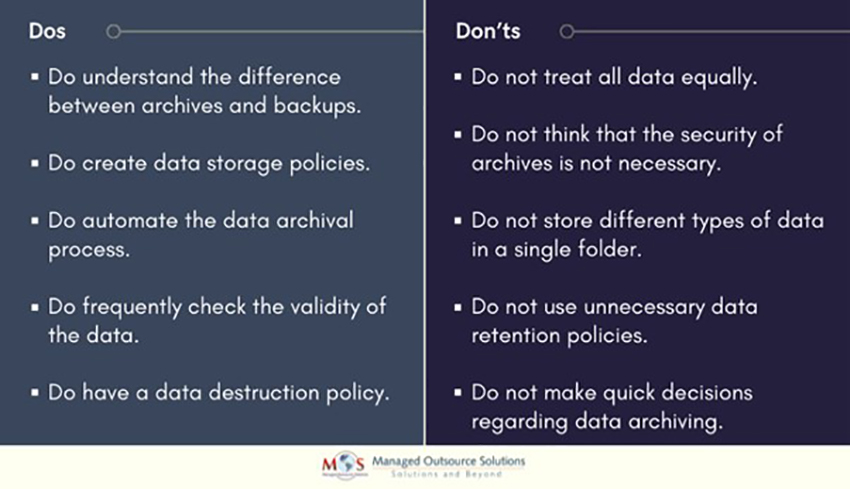Due to bulk data creation and execution, data archiving has become really important. A document scanning company can help businesses manage large-volume data by helping to digitize paper-based assets. The service provider can perform data archiving, storage and management in a more effective manner without you having to spend too much money on it. Businesses need data archiving to maintain old data while new information is added day today.
What is data archiving?
In simple terms, data archiving is a process of selecting data that is no longer active and transferring it to other storage systems for future reference. A reliable data archiving strategy helps the users to access the old data in a faster and more cost-effective manner. It also helps clarify how to transfer data while staying compliant with applicable rules and regulations.
Dos
Do understand the difference between archives and backups
In recent years, there has been an effort to diminish the demarcating line between archives and backups. Try to understand the purpose of both services. The former is for long-term storage and the latter is for data recovery mechanisms.
Do create data storage policies
Create data storage policies that help you to identify where data needs to be stored, and the types of data to be archived. This is one of the important data management strategies to ensure that all data and information stored can be retrieved when needed.
Do automate the data archival process
It’s not always practical to use manual methods to archive data in an effective way. Automation helps you to lower the operating costs, improve the safety of the documents, and to be more competitive. It also helps you to reduce the errors associated with manual archiving.
Do frequently check the validity of the data
In some cases, you need to keep some information for five years, whereas in some other cases it may be ten or twelve years. So, once you get the data, you can check how long that data needs to be stored.
Do implement a reliable data destruction policy
Try to manage a team of experts exclusively for managing the data destruction process. This helps to make sure that all data is destroyed with proper security requirements at the proper time.
Don’ts
Do not treat all data equally
As there are different types of data, the data archiving standards tend to vary. For example, some organizations may need to keep financial data of five years and medical data of 10 or 12 years. It is also important to understand that the same organization may not want to archive some data that they consider unnecessary.
Do not think that the security of archives is not necessary
Do not compromise the security of archives just because of the staleness of the data. It may contain the financial status of the organization, personal identification information of the employees and anything else needed for the functioning of the company.
Do not store different types of data in a single folder
Try to put different types of archived data in different folders. It helps us to avoid losing the entire data due to errors that are mostly unpredictable.
Do not use unnecessary data retention policies
Avoid creating and enforcing unnecessary data retention policies that have a huge potential for misuse.
Do not make quick decisions regarding document scanning and conversion
When archiving data, you can utilize document scanning services to make the process flawless and efficient. However, do not make a quick decision regarding a service provider. Many service providers are emerging and the choice must be discretely made. You can sit and talk with experts and service providers for a better understanding of the process and its benefits.
The business world is on a continuous move to achieve all possible technological advancements. Digitization, automation and other requirements have increased the significance of reputable document scanning companies. With the advent of Big Data and its immense potential for businesses, data collection, maintenance, storage, and archiving have also gained importance. Businesses and organizations that acquire new information regularly are all in need of a practical solution like outsourcing. Effective data archiving for future retrieval and use will definitely improve the bottom line of every company.
| Also read Importance of Archiving and Organizing Documents for Digitization |





